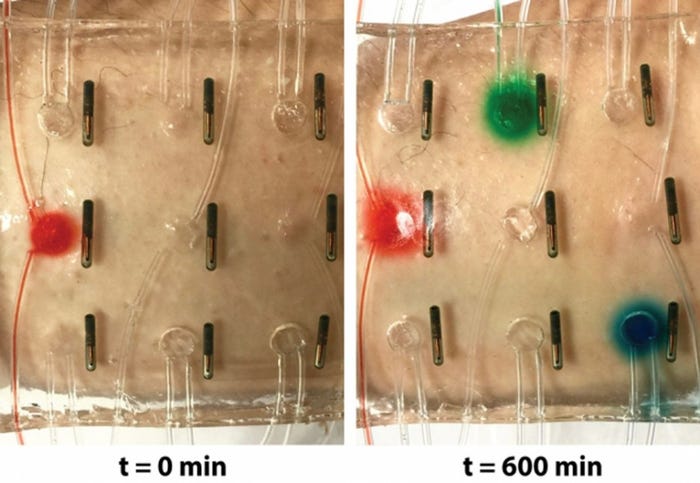December 8, 2015
A stretchy, adhesive bandage that makes use of temperature sensors and LED lights could be the world's first "smart band-aid." The technology could also be useful for prosthetic and mobile health applications.
Kristopher Sturgis
Little has changed with bandages since the invention of the Band-Aid in 1920. While there are now a variety of bandages available and some include antimicrobials to stave off infection, they do not actively guide wound healing.
That could change with the launch of a new flexible electronics technology that can offer drug-delivering capabilities, administering medication in response to specific changes in the body. The technology also could be potentially used for implantable glucose sensors and a range of other applications.
In the video below, a stretchy hydrogel embedded is bonded to a matrix of polymer islands (in red) that can encapsulate electronic components.
"We embedded drug delivery channels and reservoirs inside the robust, biocompatible hydrogel matrix, so that drugs can be released from the hydrogel matrix in an on-demand and controlled manner," says Xuanhe Zhao, associate professor in the department of mechanical engineering at MIT and creator of the technology.
The novelty of the design is the hydrogel matrix, a rubbery material that is 90% water and can bond with a variety of materials including glass, silicon, ceramics, aluminum, and titanium.
"Common hydrogels are brittle, barely stretchable, and adhere weakly to electronic materials," Zhao says. "We recently developed robust, stretchable, and biocompatible hydrogels that strongly bond to various electronic materials, and this new capability is what enables these stretchable hydrogel electronics and devices."
These hydrogels were initially something that Zhao and his group developed with an eye on applications in soft robotics, but the biocompatibility of the hydrogels enabled them to begin exploring health-related applications.
|
The hydrogel could also be used to implant electronic devices in the body. |
"This bandage is a demonstration of a device that integrates sensors and electronics in a stretchable, robust, and biocompatible hydrogel matrix," Zhao says. "This new smart hydrogel bandage is soft, wet, and stretchable and it can sense temperature changes at various locations and deliver drugs accordingly."
Zhao stated that if the technology were to be used in close contact with the human body as a drug delivery device, it needed to use soft electronics that can also stretch and conform with the body. They began to test the technology by embedding it with a titanium wire to form a conductor, and found that it could maintain constant electrical conductivity.
Next, the group arranged an array of LED lights embedded into a sheet of hydrogel and found that the lights continued working, even when stretched across deformable areas like the knee and elbow.
The final test involved creating a "smart wound dressing" comprised of evenly spaced temperature sensors that could work in tandem with tiny drug-delivering reservoirs. The group then placed the dressing over various regions of the body and found that even when stretched to its limits, the device was able to monitor skin temperature and release drugs according to sensor readings.
For now, Zhao and his group plan to continue working on the technology to not only enhance its capabilities, but also evolve the device so that it can be used in other areas of the body.
"With collaborators, we are designing hydrogel-based neural probes that have very similar mechanical and physiological properties as the brain," Zhao says. "But for now we are working hard toward clinical applications of stretchable hydrogel electronics and devices. Novel hydrogel-based electronics and devices may have broad impacts on fields ranging from mobile health and various implanted sensors to prosthetics."
Learn more about cutting-edge medical devices at MD&M West, February 9-11 at the Anaheim Convention Center in Anaheim, CA. |
Kristopher Sturgis is a contributor to Qmed.
Like what you're reading? Subscribe to our daily e-newsletter.
About the Author(s)
You May Also Like



